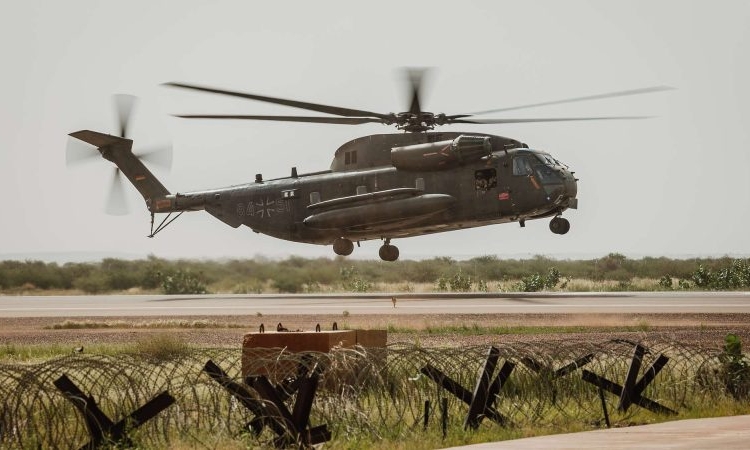The total withdrawal of the United Nations’ Multidimensional Integrated Stabilisation Mission in Mali (MINUSMA) is underway, with Germany being the latest country to pull it’s assets and personnel from the country.
Five CH-53G Super Stallion heavy-lift helicopters and personnel from the German armed forces have exited Mali after supporting the United Nations mission (MINUSMA) in Gao. The German deployment began in mid-2022 and was part of a larger international effort to stabilize the region and combat terrorism.
The helicopters are flown from the Bundeswehr base in Gao to the Malian capital Bamako. From there it goes back to Germany aboard a civilian Antonov An-124 transport aircraft.
The An-124 transport aircraft cargo hold is large enough to accommodate the Bundeswehr’s partially dismantled CH-53 helicopters and when the helicopters have arrived in Germany, they will be reassembled and made available for further flight services says a senior German military officer.
The German CH-53G Super Stallions played a vital role in MINUSMA, providing transport and logistics support for UN troops and police. The helicopters also conducted medical evacuations and delivered humanitarian aid to remote areas.
This May, German troops started to withdraw from Mali as the mission has been hampered by disputes with the ruling military junta in Bamako and the arrival of Russian forces.
The German withdrawal from Mali is coming at a time when the country is facing a number of challenges, including political instability, ethnic violence, and an ongoing insurgency. The German government has said that it will continue to support Mali and the UN mission, but that it is time for other countries to step up and contribute more.
The withdrawal of the German CH-53G Super Stallions is considered a significant loss for MINUSMA. The helicopters were a valuable asset to the mission, and their absence will make it more difficult to operate in Mali.
Germany, with 1,100 troops, is the biggest Western contingent in the UN mission. In 2019 Germany donated 29 Casspir armoured personnel carriers and other equipment including 4,100 bullet-resistant vests, 4,300 combat boots, and 2,700 ballistic helmets to Mali.
Last November, the Malian junta led by coupist Colonel Assimi Goïta denied overflight permission to Western forces currently fighting jihadists in the region. Mali’s junta declared that Western militaries including the UK, France, and Germany cannot operate their aircraft and drones in Malian airspace.
The United Nations Mission in Mali (MINUSMA) has begun its exit from the country in accordance with a request made by Malian authorities to leave by December 31 of this year.
This ongoing phased withdrawal aligns with the directives of UN Security Council (UNSC) Resolution 2690, which was adopted on June 30, 2023. The resolution explicitly calls for the cessation of MINUSMA operations and mandates a complete withdrawal by December 31, 2023. As the deadline approaches, it is anticipated that a more substantial contingent of MINUSMA staff will depart from Mali.
MINUSMA has lost over 180 of its members to date. “To date, 2,680 members of t he MINUSMA Force and 596 members of the United Nations Police (UNPOL) have been repatriated, culminating in a total of 3,276 uniformed personnel departing the mission,” said MINUSMA in the statement.
“MINUSMA has, over time, bid farewell to 81 international staff, and 10 United Nations Volunteers (UNVs). This brings the total number of departed civilian staff to 91, and when combined with the military departures, the grand tally stands at 3,367 MINUSMA personnel having left the mission,” the United Nations Multidimensional Integrated Stabilization Mission in Mali (MINUSMA) said.
The withdrawal process involves redeploying peacekeepers and essential equipment, as well as the formal restitution of camps that had been established across the nation over the past decade.
MINUSMA has successfully closed three camps at Ogossagou, Ber, and Goundam. These closures mark a significant step in the mission’s withdrawal plan, carried out in coordination with Malian authorities. The return of these sites to the state civilian authorities is a crucial component of the exit strategy, adhering to UN rules and regulations.
In June last year, the United Nations peacekeeping mission in Mali (MINUSMA), was left in urgent need of armed helicopters when Ukrainian peacekeepers left the country to join their brothers-in-arms in defending their country against the Russian invasion.





